Michael Brauner is a Senior Sports Analyst and Contributing Writer for Yellowhammer News. You can follow him on Twitter @MBraunerWNSP and hear him every weekday morning from 6 to 9 a.m. on “The Opening Kickoff” on WNSP-FM 105.5, available free online.
NIL
Wisconsin & its NIL collective sue Miami; claim tampering, NIL inducements to poach player
The University of Wisconsin and its NIL collective, VC Connect, filed a joint lawsuit on Friday against the University of Miami, alleging it knowingly induced one of the Badgers’ football players to abandon a lucrative name, image and likeness contract to play for the Hurricanes this upcoming season. Allegations of tampering rarely get to this […]
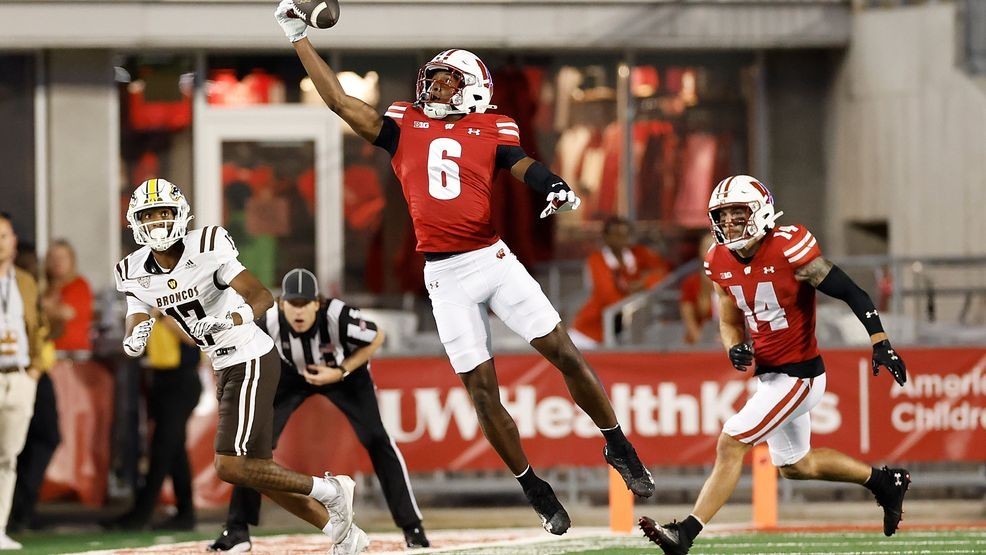
The University of Wisconsin and its NIL collective, VC Connect, filed a joint lawsuit on Friday against the University of Miami, alleging it knowingly induced one of the Badgers’ football players to abandon a lucrative name, image and likeness contract to play for the Hurricanes this upcoming season.
Allegations of tampering rarely get to this level, and the 23-page lawsuit, which was filed in state court in Wisconsin and obtained by The Associated Press, is unusual. Depending on its resolution, it could have a wider impact on future NIL deals across college athletics.
The player in question in the filing is referred to only as “Student-Athlete A.” But the case summary describes facts that line up with the situation involving cornerback Xavier Lucas, who last December announced his plans to enter the transfer portal.
Shortly afterward, Darren Heitner, who has been representing Lucas, indicated that Wisconsin was refusing to put Lucas’ name in the portal and that it was hindering his ability to talk with other schools. In January, Heitner announced that Lucas would be playing for Miami this fall.
The situation is fallout from the rapid changes engulfing college athletics, specifically a combination of two things: Athletes went to court and won the ability to transfer with much more freedom and the 2021 NCAA decision clearing the way for them to strike NIL endorsement deals now worth millions of dollars. That has changed the recruiting landscape and forced the issue of contracts and signed commitments to the fore.
“Indeed, student-athletes’ newfound NIL rights will be rendered meaningless if third parties are allowed to induce student-athletes to abandon their contractual commitments,” a portion of the lawsuit reads.
Wisconsin said in January that it had credible information that Miami and Lucas made impermissible contact with each other before the former Badgers cornerback decided to transfer.
Wisconsin and VC Connect allege that the inducement for Lucas to attend Miami happened within days of him entering his NIL agreement to play for the Badgers, and that they incurred substantial monetary and reputational harm. The lawsuit seeks unspecified monetary damages and “a declaration that Miami’s conduct directed towards Student-Athlete A constituted tampering.”
A message left with the University of Miami seeking comment was not immediately returned. In a text message Friday, Heitner declined to comment on the lawsuit but he said that Lucas still plans to attend Miami and play football.
Wisconsin said it had the support of its leadership and the Big Ten Conference in filing the lawsuit, noting its commitment to “ensuring integrity and fundamental fairness in the evolving landscape of college athletics.”
“While we reluctantly bring this case, we stand by our position that respecting and enforcing contractual obligations is essential to maintaining a level playing field,” the statement said. “In addition to our legal action, we will continue to be proactive to protect the interests of our student-athletes, our program and the broader collegiate athletics community.
Lucas, who is from Pompano Beach, Florida, had 12 tackles, an interception and a sack as a freshman for Wisconsin last season.
Heitner said that Lucas hasn’t received any money from Wisconsin and therefore owes no money to the school. Heitner also argued that Wisconsin had violated an NCAA bylaw by not entering Lucas into the transfer database within two business days of the player’s request.
Wisconsin issued a statement at the time saying it hadn’t put Lucas’ name in the portal because he had entered a two-year binding NIL agreement.
In April, the surprise transfers of brothers Nico and Madden Iamaleava from Tennessee to UCLA prompted fresh questions about contracts and buyouts.
Nico Iamaleava, who led Tennessee to the College Football Playoff last season, walked away from a reported $2.4 million NIL contract. Arkansas freshman quarterback Madden Iamaleava entered the portal after spring practices wrapped up.
Arkansas athletic director Hunter Yurachek released a statement indicating he would support efforts by the Razorbacks’ NIL collective to enforce buyout clauses in athlete contracts. Iamaleava reportedly had a contract valued at $500,000 upon signing with Arkansas.
NIL
Kenny Dillingham, Deion Sanders among Big 12 coaches questioning NIL, player pay reforms
Kenny Dillingham said, “I just want to know the rules” when it comes to clarification about NIL deals and revenue sharing. (Photo by Truitt Robinson/Cronkite News) FRISCO, Texas – The state of college sports could calmly be described as the Wild, Wild West, a stage for an old-fashioned duel between programs and the NCAA, with […]
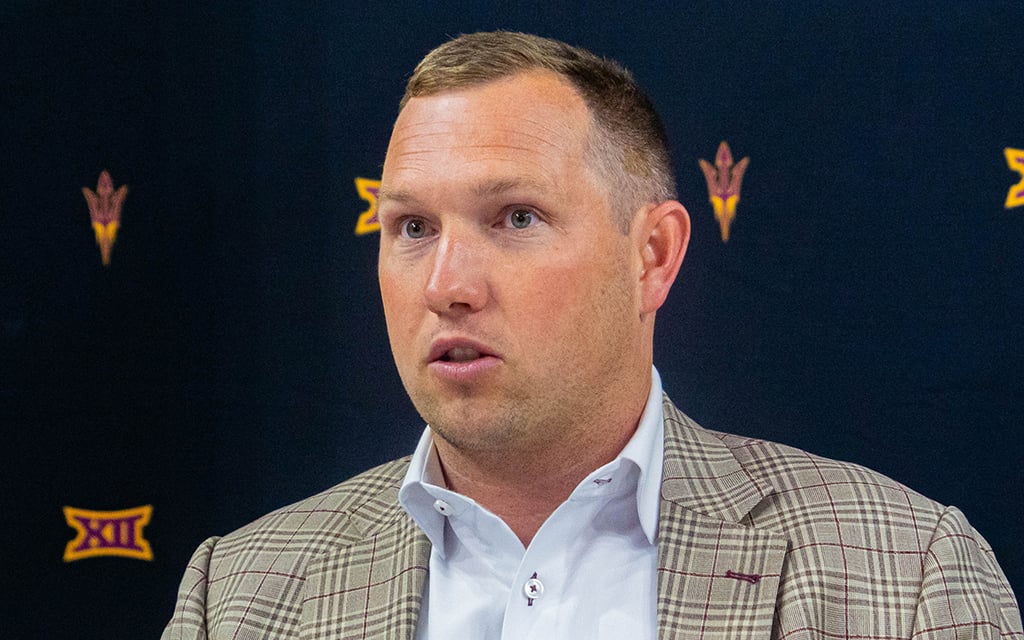

Kenny Dillingham said, “I just want to know the rules” when it comes to clarification about NIL deals and revenue sharing. (Photo by Truitt Robinson/Cronkite News)
FRISCO, Texas – The state of college sports could calmly be described as the Wild, Wild West, a stage for an old-fashioned duel between programs and the NCAA, with athletes standing somewhere in the middle.
Texas is a fitting setting for such showdowns.
Big 12 Media Days provided several opportunities for coaches in the conference to voice their displeasure with the current system and how players are paid like NFL stars. Even though power conference teams like those within the Big 12 do benefit in terms of securing more commitments from the best available players, they realize it’s an unjust and unfair system that could monopolize the sport indefinitely.
“We’re in the profession and we don’t even know the rules,” Cincinnati football coach Scott Satterfield said. “It’s difficult, and it’s ever-changing. There’s nothing that’s been stable, really, since 2020. Things have changed so much and so fast.”
Recruiting is among the biggest challenges. Though the NCAA reached a settlement in June that would give $2.8 billion for colleges to pay athletes, the NCAA is negotiating with House plaintiff lawyers to apply rules and repercussions to schools that attempt to avoid the cap in compensation packages offered to incoming players. Third-party NIL deals are being fully guaranteed, which would go against new revenue-sharing rules. Programs are also offering contracts that would be impossible to fit beneath the $20.8 million annual compensation cap.
Arizona State coach Kenny Dillingham, who captured the Big 12 crown last season behind a slew of portal additions, is eager for a clear-cut direction for the sport so college football can return to what he believes are the values at its core.
“I just want to know the rules,” Dillingham said. “Tell us where the sandbox is and we’ll play in it. At the end of the day, this is a game. I know this is a business, I know this is a profession for everybody. But anybody who’s not in this to see a kid go from an 18-year-old kid to a 22-year-old man, and enter the real world, is in it for the wrong reasons.”
In a time when players can earn millions of dollars as freshmen or by entering the portal, the players a team retains for several years become the most crucial ones on the roster.
“In this new era where you have 105 kids on scholarship, it’s all about retaining the guys on your team,” Dillingham said. “If you constantly are looking for the next best thing to replace the guys on your team, then your own guys and your team should leave. Why wouldn’t they? If you’re not loyal to them, they shouldn’t be loyal to you.”

Colorado coach Deion Sanders said he wishes the new era of college football included a hard salary cap with a system to rank player salaries based on ability. (Photo by Truitt Robinson/Cronkite News)
The two-way street of loyalty and trust between players and coaching staff is occasionally the deciding factor for players being recruited with similarly hefty bags of cash. Coaches argue that it should return to the forefront of the recruiting process. That point is only emphasized by the fact that hundreds of submitted NIL deals hang in limbo while the College Sports Commission and NIL clearinghouse manage the fallout of the settlement.
Colorado coach Deion Sanders proposed a hard salary cap with a system to tier rank player salaries based on ability and overall performance.
“I wish there was a cap,” Sanders said. “The top-of-the-line guy player makes this, and if you’re not that type of guy, you know you’re not going to make that. That’s what the NFL does. The problem is you have a guy that’s not that darn good, but he could go to another school and they give him half a million dollars, and you can’t compete with that. It doesn’t make sense.”
Moments earlier, however, Sanders praised Texas Tech coach Joey McGuire for spending aggressively in the transfer portal. The Red Raiders flipped their team into a recruiting juggernaut almost overnight, spending upwards of $50 million on players, which was split into $30 million front-loaded and another $20.5 million courtesy of the revenue-share. Front-loaded contracts allowed school collectives to pay players before the enforcement of the settlement on July 1.
McGuire, whose Red Raiders figure to contend for the Big 12 title and a College Football Playoff selection this fall, said his aggression is just taking advantage of the current state of affairs, and more schools should do the same to compete with the annual contenders from the SEC and Big Ten.
Utah coach Kyle Whittingham, entering his 21st season at the helm of the Utes, echoed Sanders’ sentiment about a salary cap. He acknowledged that players are moving toward becoming official employees, though the contracts they are now signing to get paid make them employees in every way but the official title. Whittingham remains unsure of the extent to which he supports employing college athletes.
“You say, ‘college football’s not the NFL,’ but the NFL has been doing some good things for a lot of years,” Whittingham said. “We ought to take some pages from them on how to implement a salary cap and collective bargaining if it comes to that. … As distasteful as it might sound to some people, I think an NFL minor league model is the best direction to hit.”
Until new policies can be enforced at every level of college football to ensure more parity and a fair state of play, the formula for winning national championships is printed on a blank check.
“All you have to do is look at the College Football Playoff and see what those teams spent,” Sanders said. “And you’ll understand darn well why they’re in the playoffs.”
NIL
The top 5 in every major category
The greatest career’s in Kentucky history broken down into wild statistics Kentucky’s basketball history is dripping with legends—and numbers don’t lie. From Issel’s scoring dominance to Magloire’s shot-swatting reign, here are the Cats’ top five in every major career stat category. Let the barbershop debates begin. Scoring Denver Nuggets v Washington Bullets | Focus On […]
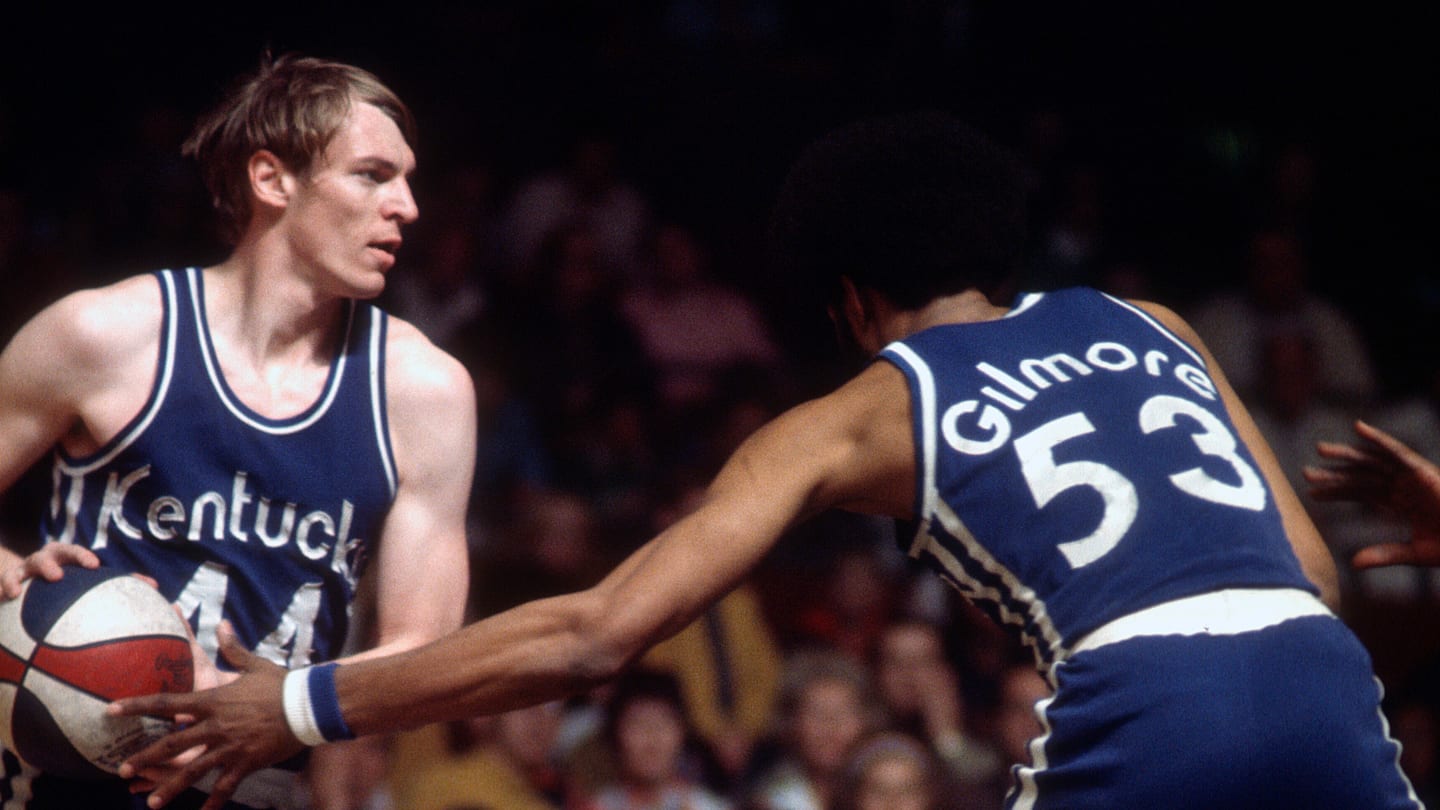
The greatest career’s in Kentucky history broken down into wild statistics
Kentucky’s basketball history is dripping with legends—and numbers don’t lie. From Issel’s scoring dominance to Magloire’s shot-swatting reign, here are the Cats’ top five in every major career stat category. Let the barbershop debates begin.
Scoring

1. Dan Issel – 2,138 points (1967–70)
2. Kenny Walker – 2,080 (1982–86)
3, Jack “Goose” Givens – 2,038 (1974–78)
4, Keith Bogans – 1,923 (1999–03)
5. Tony Delk – 1,890 (1992–96)
Assists (Since 1962)

1. Dirk Minniefield – 646 (1979–83)
2. Anthony Epps – 544 (1993–97)
3. Roger Harden – 498 (1982–86)
4. Wayne Turner – 494 (1995–99)
5. Sean Woods – 482 (1989–92)
3-Pointers made

1. Tony Delk – 283 (1992–96)
2. Keith Bogans – 254 (1999–03)
3. Tayshaun Prince – 204 (1998–02)
4. Gerald Fitch – 199 (2000–04)
5. Derrick Miller – 191 (1986–90)
Rebounds

1. Dan Issel – 1,078 (1967–70)
2. Frank Ramsey – 1,038 (1950–54)
3. Cliff Hagan – 1,035 (1950–54)
4. Johnny Cox – 1,004 (1956–59)
5. Cotton Nash – 962 (1961–64)
Steals

1. Wayne Turner – 238 (1995–99)
2. Tony Delk – 201 (1992–96)
3. Cliff Hawkins – 199 (2000–04)
4. Ed Davender – 191 (1984–88)
5. Jared Prickett – 187 (1992–97)
Blocks

1. Jamaal Magloire – 268 (1996–00)
2. Willie Cauley-Stein – 233 (2012–15)
3. Melvin Turpin – 226 (1980–84)
4. Sam Bowie – 218 (1979–84)
5. Andre Riddick – 212 (1991–95)
From the 50s to the Final Four runs of the 90s and beyond, Kentucky’s stat leaders are a timeline of greatness. It’s not just tradition—it’s numbers, and the bar is always high. There will probably never be a player stay around in college long enough to even come close to Dan Issel’s records, but with NIL maybe someone can overtake the gawdy numbers The Horse put up.
NIL
ESPN releases final mock draft, predictions for first two rounds
The 2025 MLB Draft is rapidly approaching. Selections are getting underway this weekend on Sunday, July 13. This year’s edition is loaded with talent from both the college and high school ranks, headlined by the two best pitchers from the 2025 college baseball season. ESPN released its final mock draft prior to this weekend’s event, […]

The 2025 MLB Draft is rapidly approaching. Selections are getting underway this weekend on Sunday, July 13.
This year’s edition is loaded with talent from both the college and high school ranks, headlined by the two best pitchers from the 2025 college baseball season. ESPN released its final mock draft prior to this weekend’s event, featured below.
1. Washington Nationals: LHP Kade Anderson, LSU
LSU sophomore left-handed pitcher Kade Anderson has skyrocketed to the projected No. 1 pick in the MLB Draft. Anderson led all college pitchers this season in strikeouts (180) and pitched to a 3.18 ERA in 119 innings. He held Coastal Carolina to just three hits and no runs with 10 strikeouts in the opening game of the College World Series Final, posting the first CWS shutout since 2018.
“I mean, his next pitch should be for someplace in the Washington Nationals organization,” LSU coach Jay Johnson said following their win in the CWS. “It’s not close. And they usually draft really well. And he’s the best player in the country. There’s nobody closer to the Major Leagues than that right now.”
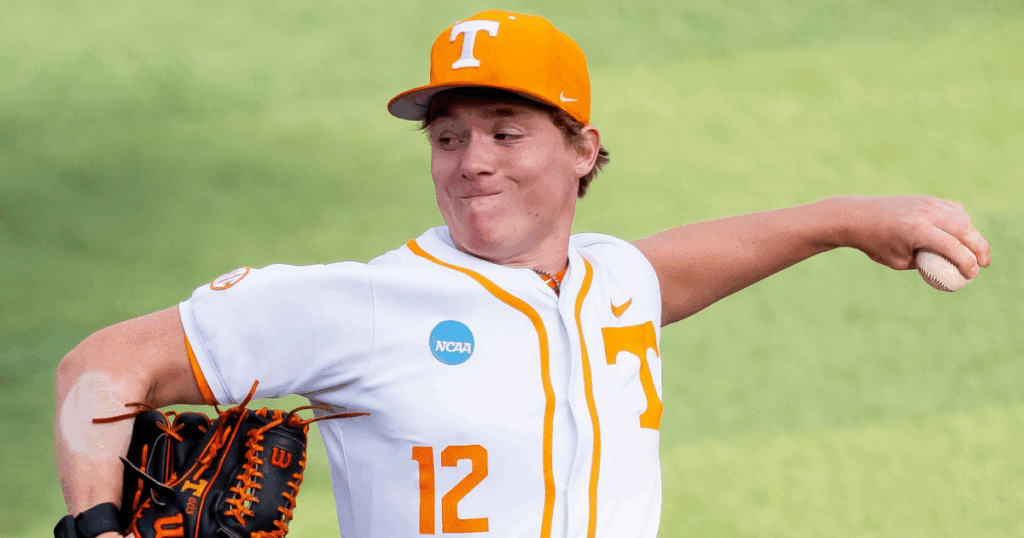
Tennessee left-handed pitcher Liam Doyle ranked second in the country in strikeouts (164) behind Anderson, pitching to a 3.20 ERA in 95 2/3 innings this season. He struggled a bit down the final stretch, however, posting a 6.86 ERA over his final five starts (21 innings).
Doyle, however, remains positioned to be the highest drafted pitcher in Tennessee program history. This comes after transferring from Ole Miss prior to the season.
Right-handed pitcher Seth Hernandez out of Corona High School (CA) would mark Cincinnati’s third straight selection of an arm in the Top 10 picks. Hernandez is the top high school pitching prospect of the 2025 class and has reached 100 mph on his fastball.
He’s verbally committed to Vanderbilt. But it looks like he probably won’t reach campus and will choose to go pro.
Holliday, who is the son of seven-time MLB All-Star Matt Holliday and brother of Jackson Holliday (First Overall Pick in the 2022 MLB Draft), was projected as the No. 1 pick for most of the past year. But he has slipped a bit recently.
He was recently named Gatorade’s Oklahoma Player of the Year at Stillwater High School and looks to become the fourth No. 1 pick out of high school in the past 10 MLB Drafts. He’s verbally committed to Oklahoma State, but it looks like he probably won’t reach campus.
5. St. Louis Cardinals: SS Eli Willits, Oklahoma commit
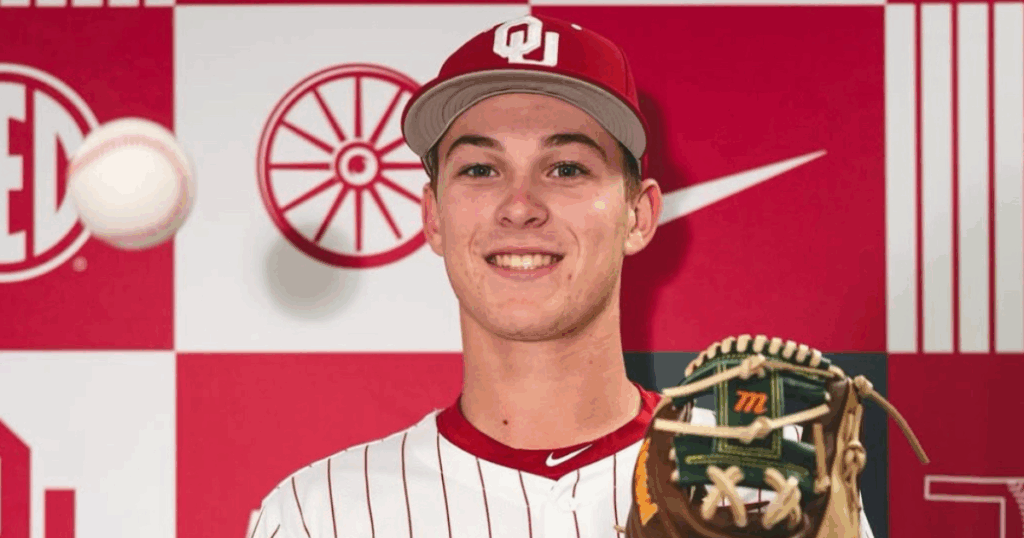
Fort-Cobb Broxton (OK) High product Eli Willits is one of three talented high school shortstops projected in the Top 10 of this year’s draft. He is listed at No. 5 on MiLB.com’s Prospect Rankings ahead of Carlson and is a proficient switch-hitter. His father, Reggie Willits, is a former MLB veteran who is now an associate head coach at Oklahoma.
His brother, Jaxon, started 50 games for the Sooners at shortstop this season. He’s also verbally committed to Oklahoma, but it looks like he probably won’t reach campus.
Oregon State shortstop Aiva Arquette was originally selected in the 18th round of the 2022 MLB Draft by the Arizona Diamondbacks, but bet on himself and returned to college. The decision paid off mightily, as the 2025 First Team All-American is projected as the No. 3 pick in the 2025 Draft.
Starting for a Beaver program that made the College World Series for the first time since 2018, Arquette hit for a .354 average with 17 doubles, 19 home runs, 66 RBI, a .654 SLG% and a .461 OBP%. He would become Oregon State‘s third top-three pick in the last seven Drafts.
Shortstop JoJo Parker is the third projected high school shortstop to be selected in the top-10. He’s the twin brother of Perfect Game All-American Jacob Parker and his tabbed as MiLB’s No. 9 ranked prospect.
He’s verbally committed to Mississippi State. But it looks like he probably won’t reach campus and will choose to go pro.
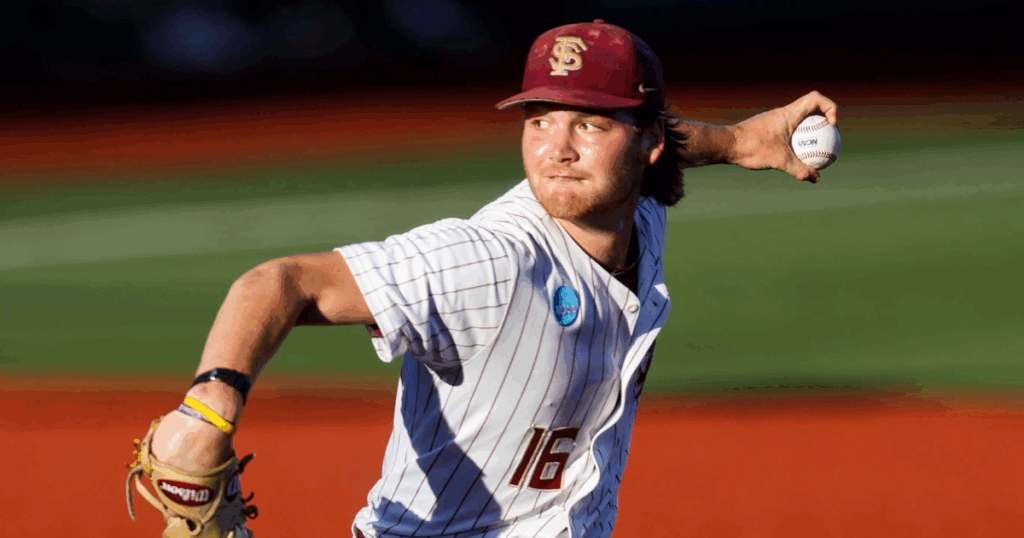
Florida State left-handed pitcher Jamie Arnold is the third projected college lefty to go in the top-five picks in this Mock Draft. He capped off back-to-back stellar campaigns for the Seminoles by pitching to a 2.98 ERA with 119 strikeouts in 84 2/3 innings this season.
In 13 2/3 innings of work in this year’s NCAA Tournament, Arnold led FSU to two wins (Mississippi State and Oregon State) by pitching to a 2.63 ERA with 22 strikeouts. He seems poised to be Florida State’s highest drafted arm since right-hander Jonathan Johnson went No. 7 overall in 1995.
Auburn‘s Ike Irish was one of the best catchers in college baseball in 2024, but transitioned to the outfield in 2025. He excelled there as well, making just two errors in 55 games. Offensively, he hit for a .364 average with 13 doubles, 19 home runs and 58 RBI for a 40-win Tiger team.
Over the span of three seasons, Irish hit for a .350 average with 48 doubles, 39 home runs and 167 RBI. He was named to the All-SEC First Team in both 2024 and 2025.
10. Chicago White Sox: SS Billy Carlson, Tennessee commit
Billy Carlson is a stud defensive shortstop out of Corona High School in California. He is one of two prospects out of Corona High (RHP Seth Hernandez) projected as First-Round picks. He was once a two-way player (with a fastball in the mid-90s), but he has focused on the infield as he embarks on his professional baseball journey.
He is currently verbally committed to Tennessee. But it looks like he probably won’t reach campus and go pro instead.
Picks 11-30 of the draft
11. Athletics: RHP Kyson Witherspoon, Oklahoma
12. Texas Rangers: SS Steele Hall, Tennessee commit
13. San Francisco Giants: OF Brendan Summerhill, Arizona
14. Tampa Bay Rays: OF Jaden Fauske, LSU commit
15. Boston Red Sox: 3B Gavin Fien, Texas commit
16. Minnesota Twins: 2B Gavin Kilen, Tennessee
17. Chicago Cubs: 3B Josh Hammond, Wake Forest commit
18. Arizona Diamondbacks: C Caden Bodine, Coastal Carolina
19. Baltimore Orioles: SS Wehiwa Aloy, Arkansas
20. Milwaukee Brewers: SS Marek Houston, Wake Forest
21. Houston Astros: OF Jace LaViolette, Texas A&M
22. Atlanta Braves: RHP Tyler Bremner, UC Santa Barbara
23. Kansas City Royals: RHP Gage Wood, Arkansas
24. Detroit Tigers: SS Daniel Pierce, Georgia commit
25. San Diego Padres: 3B/OF Quentin Young, LSU commit
26. Philadelphia Phillies: RHP Matthew Fisher, Indiana commit
27. Cleveland Guardians: SS Tate Southisene, USC commit
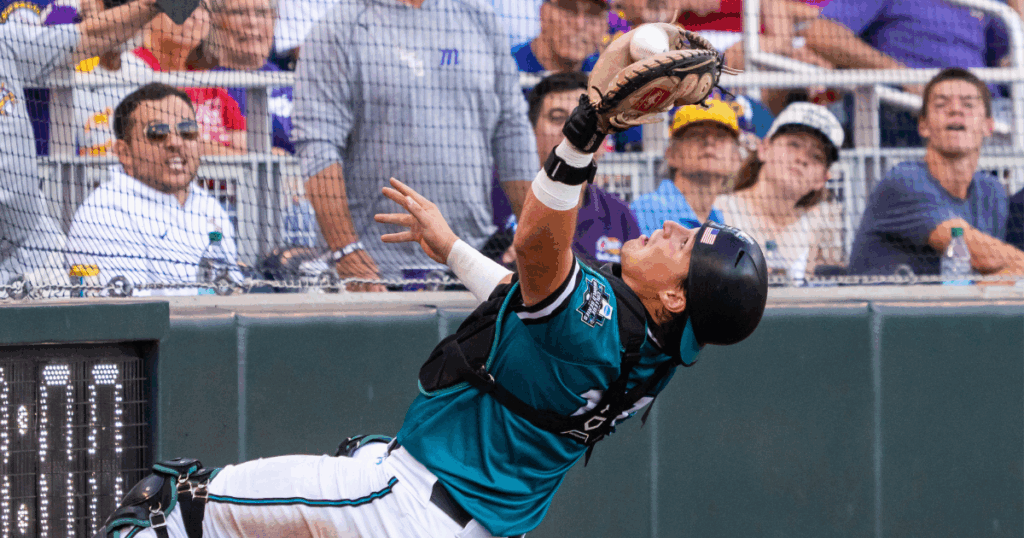
28. Kansas City Royals: RHP Aaron Watson, Florida commit
Compensatory Round of draft
29. Arizona Diamondbacks: OF Slater de Brun, Vanderbilt commit
30. Baltimore Orioles: 3B Xavier Neyens, Oregon State commit
31. Baltimore Orioles: 1B/3B Andrew Fischer, Tennessee
32. Milwaukee Brewers: SS/2B Kayson Cunningham, Texas commit
Competitive Balance Round A of draft
33. Boston Red Sox: RHP Marcus Phillips, Tennessee
34. Detroit Tigers: SS Coy James, Ole Miss commit
35. Seattle Mariners: LHP Zach Root, Arkansas
36. Minnesota Twins: OF Devin Taylor, Indiana
37. Baltimore Orioles: SS Dax Kilby, Clemson commit
38. New York Mets: RHP Patrick Forbes, Louisville
39. New York Yankees: RHP JB Middleton, Southern Miss
40. Los Angeles Dodgers: OF Cam Cannarella, Clemson
41. Los Angeles Dodgers: LHP Kruz Schoolcraft, Tennessee commit
42. Tampa Bay Rays: RHP Anthony Eyanson, LSU
43. Miami Marlins: OF Charles Davalan, Arkansas
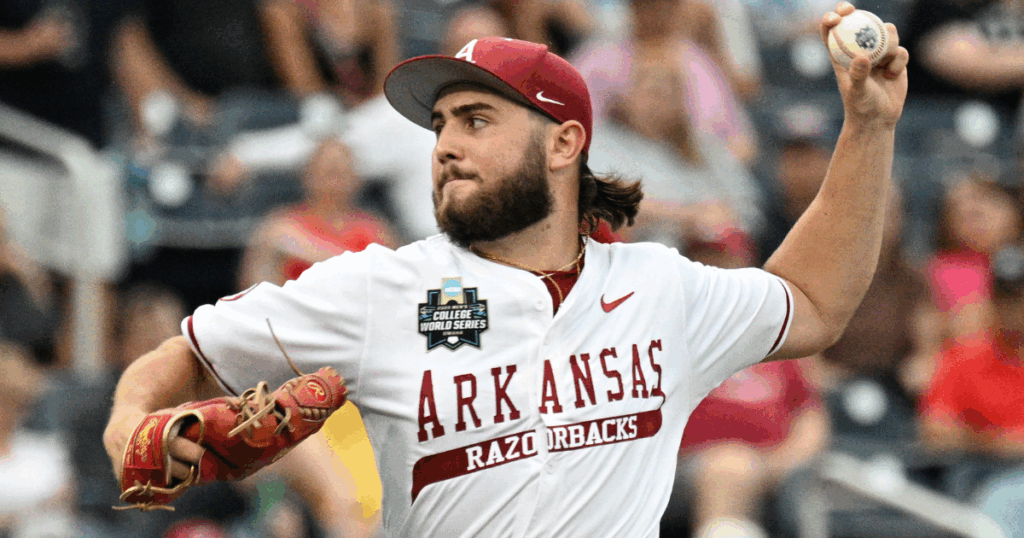
Second Round of draft
44. Chicago White Sox: OF Ethan Conrad, Wake Forest
45. Colorado Rockies: 2B/OF Sean Gamble, Vanderbilt commit
46. Miami Marlins: SS Josh Owens, Georgia Southern commit
47. Los Angeles Angels: OF Max Belyeu, Texas
48. Athletics: SS Alex Lodise, Florida State
49. Washington Nationals: LHP J.D. Thompson, Vanderbilt
50. Pittsburgh Pirates: C Luke Stevenson, North Carolina
51. Cincinnati Reds: C Taitn Gray, Oregon commit
52. Texas Rangers: C Michael Oliveto, Yale commit
53. Tampa Bay Rays: OF Dean Moss, LSU commit
54. Minnesota Twins: OF Brandon Compton, Arizona State
55. St. Louis Cardinals: SS Cooper Flemming, Vanderbilt commit
56. Chicago Cubs: OF Josiah Hartshorn, Texas A&M commit
57. Seattle Mariners: RHP Malachi Witherspoon, Oklahoma
58. Baltimore Orioles: OF Mason Neville, Oregon
59. Milwaukee Brewers: RHP Chase Shores, LSU
60. Atlanta Braves: CF Kane Kepley, North Carolina
61. Kansas City Royals: RHP Riley Quick, Alabama
62. Detroit Tigers: 2B Mitch Voit, Michigan
63. Philadelphia Phillies: OF Alec Blair, Oklahoma commit
64. Cleveland Guardians: SS Jordan Yost, Florida commit
65. Los Angeles Dodgers: SS Aidan West, NC State commit
Competitive Balance Round B of draft
66. Cleveland Guardians: LHP Cade Obermueller, Iowa
67. Tampa Bay Rays: RHP A.J. Russell, Tennessee
68. Milwaukee Brewers: 3B Dean Curley, Tennessee
69. Baltimore Orioles: OF Korbyn Dickerson, Indiana
70. Cleveland Guardians: LHP Aiden Stillman, Vanderbilt commit
71. Kansas City Royals: RHP Angel Cervantes, UCLA commit
72. St. Louis Cardinals: LHP Briggs McKenzie, LSU commit
73. Pittsburgh Pirates: 1B Ethan Petry, South Carolina
74. Colorado Rockies: OF James Quinn-Irons, George Mason
75. Boston Red Sox: OF Jake Cook, Southern Miss
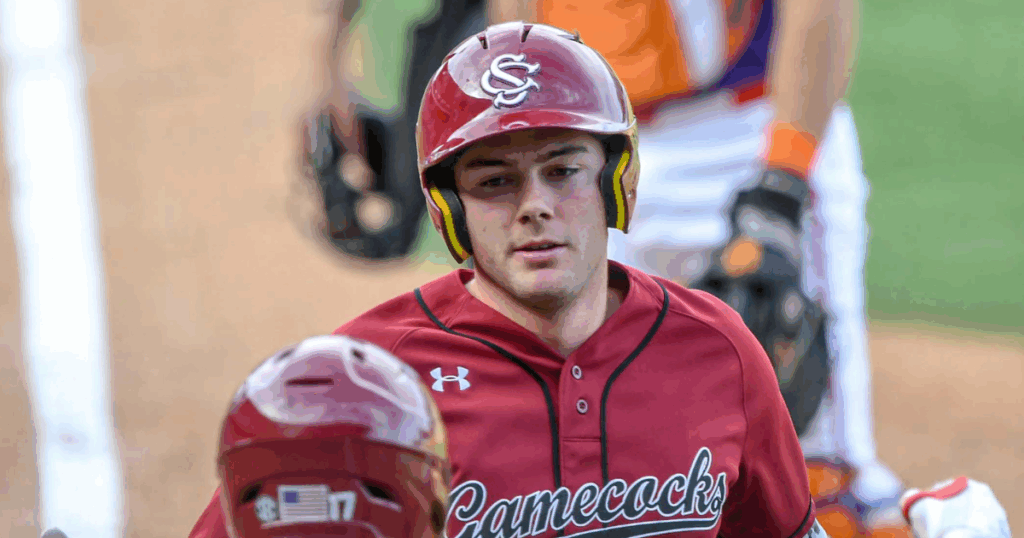
NIL
Deion Sanders addressed Texas Tech’s wild NIL spending
The question was about Texas Tech. The answer? Classic Coach Prime. At Big 12 Media Days in Frisco on Tuesday, Deion Sanders took a brief detour from quarterback questions and health updates to weigh in on what everyone in college football has been whispering about: NIL money, the transfer portal, and how Texas Tech is […]

The question was about Texas Tech.
The answer? Classic Coach Prime.
At Big 12 Media Days in Frisco on Tuesday, Deion Sanders took a brief detour from quarterback questions and health updates to weigh in on what everyone in college football has been whispering about: NIL money, the transfer portal, and how Texas Tech is handing out deals like it’s the MLB trade deadline.
“Joey’s got some money! He’s spending that money! I love it.”
Coach Prime on Texas Tech NIL spending
That “Joey” is Texas Tech head coach Joey McGuire—an old friend of Sanders from their time in Texas high school football—and now, the leader of college football’s second-ranked incoming transfer class.
Tech has landed 21 transfers this cycle and recently signed five-star tackle Felix Ojo (who visited Colorado in May) to a reported $5.1 million revenue-sharing deal.
Let that number marinate for a second.
$5.1 million. For a high school senior.
From target to trendsetter
What made Prime’s comments great was what came next.
“Once upon a time, you guys were talking junk about me going in that portal. Now when everybody goes in the portal, it’s OK. It’s cool when they do it. It’s a problem when I do it. Ain’t that a rap song?”
It is a rap song, and it’s also a dead-on point.
Two years ago, Sanders was the villain of college football for flipping Colorado’s roster inside-out through the portal. The media backlash was loud.
But now? Joey McGuire does it. Purdue does it. Even Bill Belichick at UNC is diving in. Suddenly, it’s innovative.
Funny how that works.
The NIL divide
The truth is—Texas Tech has big-time financial backing.
Their top donor, Cody Campbell, is reportedly helping bankroll $55 million in NIL deals across Tech athletics. That’s not a typo. That’s oil money, West Texas style. And it’s creating a major gap between haves and have-nots in the Big 12.
Colorado? We’re not there yet.
“Can you send a few of those dollars to us so we can get some of those players too?” Sanders joked.
And sure, he was half-kidding. But there’s truth behind the humor. The Buffs aren’t poor by any means—but compared to the booster-driven NIL war chests at places like Tech, USC, or even Utah, CU is still playing catch-up.

Coach Prime’s cap vision
Sanders didn’t stop there. He also shared something deeper.
“I wish it was a cap. The top player makes this, and if you’re not that type of guy, you know you’re not going to make that. That’s what the NFL does. The problem is you’ve got a guy that’s not that darn good, but he could go to another school and they give him half a million dollars. You can’t compete with that.”
It was a rare moment. It highlights what we already know: Coach Prime is trying to build something sustainable in Boulder.
He’s not against NIL, and he’s all for players getting paid. But Coach wants a system that makes sense and one that is fair. One that keeps the sport from turning into a free-agent circus every December.
Mutual respect, real talk
There’s no beef between Sanders and McGuire. In fact, there’s a ton of mutual admiration. Prime called McGuire “one of the best coaches in the conference” and a “man of standard.” That’s high praise.
And don’t forget—last season, Sanders and the Buffs went into Lubbock and beat Tech 41-27. Tortillas flew. Debris hit the field. It was the wildest road environment Colorado played in all year.
And when things got heated, it was McGuire who grabbed the mic and told Tech fans to chill.
“Joey told them to stop throwing at us or there’d be consequences,” Sanders said. “And I love that. I love Joey.”
But don’t mistake love for complacency.
Coach Prime sees what’s happening in this new NIL world. He’s not bitter—but he’s definitely aware. He’s the trendsetter, and now everyone else is catching up, but with deeper pockets.

Where the Buffs stand
This was a glimpse at the new college football arms race, and where Colorado stands in it.
The Buffs are trending in the right direction, but to truly compete in the Big 12 and beyond, we need to close the financial gap.
That means donors stepping up and fans supporting NIL collectives.
We need to match the energy that Tech is bringing, but because of who Prime is, that would bring serious criticism.
However, if we want to make Boulder the permanent home of college football’s most electric head coach, we better keep giving him the resources to fight.
— Want more stories like this? Follow us on X for all things Colorado Football and Basketball.
NIL
QB Jake Retzlaff announces his withdrawal from BYU
Open Extended Reactions Jake Retzlaff announced on Friday that he’s withdrawing from BYU, formally initiating his transfer process from the school. Retzlaff, BYU’s starting quarterback last year, said in an Instagram post that he made the “difficult decision” to withdraw and that he plans to “step away” from the BYU program. The post makes public […]


Jake Retzlaff announced on Friday that he’s withdrawing from BYU, formally initiating his transfer process from the school.
Retzlaff, BYU’s starting quarterback last year, said in an Instagram post that he made the “difficult decision” to withdraw and that he plans to “step away” from the BYU program. The post makes public what had been expected, as Retzlaff began informing his teammates and coaches in late June of his intent to transfer.
According to ESPN sources, Retzlaff’s path to transfer to a new school is not expected to come from the NCAA transfer portal. With Retzlaff just short of graduating, which would make the transfer process more traditional, he plans to simply leave BYU and then enroll at a new school.
Editor’s Picks
That path is not a common one, but there’s precedent. That includes former Wisconsin defensive back Xavier Lucas leaving school this winter and enrolling at the University of Miami.
Retzlaff expressed his gratitude for his time at BYU, saying “it has meant more to me than just football.” He added that he’s “excited to turn the page and embrace the next chapter.”
BYU officials generally avoided the topic of Retzlaff at Big 12 media days this week, deferring to him to make a statement on his next move.
In a statement on Friday, BYU athletics said: “We are grateful for the time Jake Retzlaff has spent at BYU. As he moves forward, BYU Athletics understands and respects Jake’s decision to withdraw from BYU, and we wish him all the best as he enters the next phase of his career.”
Retzlaff’s departure comes in the wake of BYU’s planned seven-game suspension of him for violating the school’s honor code.
That suspension arose after he was accused in a lawsuit of raping a woman in 2023. The lawsuit ended up being dismissed on June 30, with the parties jointly agreeing to dismiss with prejudice, but Retzlaff’s response included an admission of premarital sex, which is a violation of the BYU honor code.
Retzlaff went 11-2 as BYU’s starting quarterback in 2024, throwing for 2,947 yards and 20 touchdowns. His departure leaves BYU with a three-way quarterback race this summer to replace him, with no clear favorite.
NIL
Shomari Figures making bipartisan play to address NIL with support from GOP leaders …
A new effort across party lines to bring order to the chaotic world of name, image and likeness (NIL) in college sports took a big step forward this week with the introduction of legislation proposing to establish a national framework for student-athlete compensation — thanks in part to an Alabama congressman. The NIL era in […]
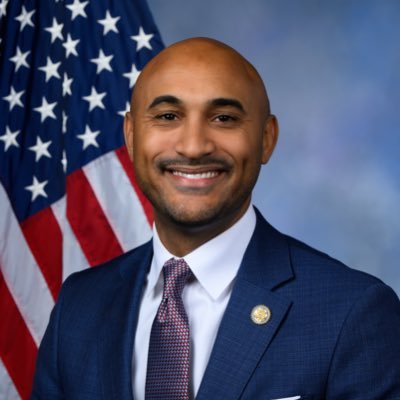

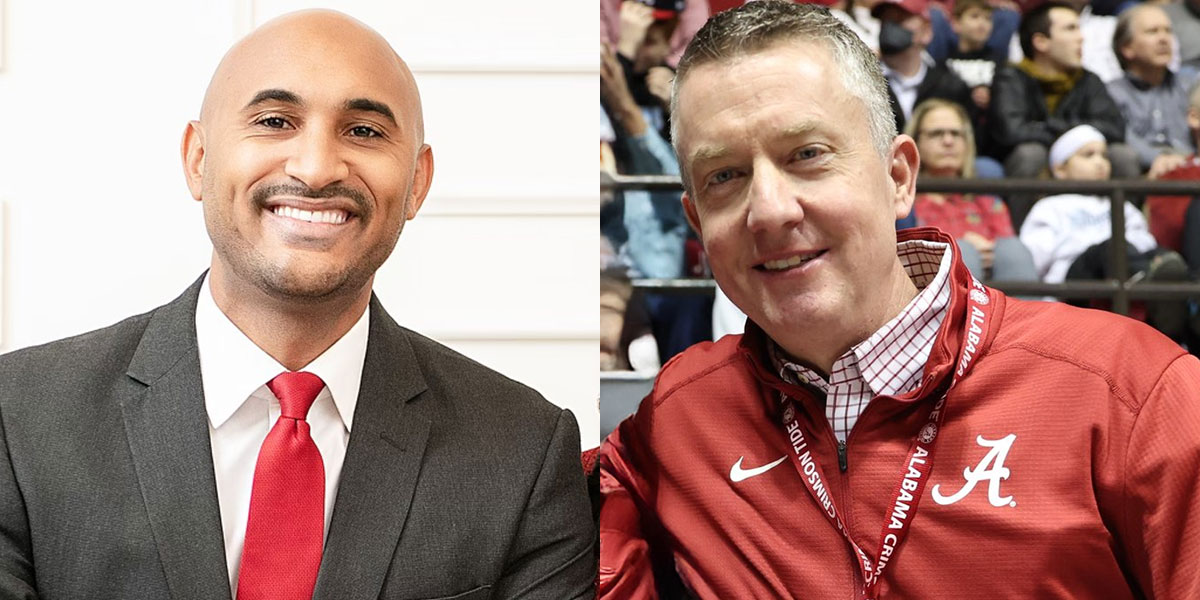
A new effort across party lines to bring order to the chaotic world of name, image and likeness (NIL) in college sports took a big step forward this week with the introduction of legislation proposing to establish a national framework for student-athlete compensation — thanks in part to an Alabama congressman.
The NIL era in college sports has brought a period of unprecedented chaos where legal pay-for-play has ruled the landscape and only widened the gap between those with financial backing to buy entire rosters and those without.
Even in the wake of the House settlement, the need for government intervention and federal legislation has become increasingly clear, though years of legislative momentum on that front have yet to produce results.
RELATED: Sen. Tuberville: With the future of college sports at stake, Congress must act on NIL
RELATED: ‘This model is unsustainable’: Saban unleashes new NIL tangent after CFB Championship
U.S. Rep. Shomari C. Figures (D-Mobile) announced this week that he was co-sponsoring a bill known as the Student Compensation and Opportunity through Rights and Endorsements (SCORE) Act, which would enact a national framework for NIL.
“The current college sports environment has drastically changed in the NIL era, and this bill provides a framework to where students can not only be compensated but also have access to resources like health care and financial literacy courses, to ensure they have a solid foundation for their lives after college and we can get back to just playing ball,” Figures said in an announcement this week.
“I look forward to continuing the bipartisan work to make this the strongest bill possible and protect student-athletes, schools, and our athletic conferences.”
Republican U.S. Reps. Brett Guthrie (R-KY), Tim Walberg (R-MI), and Jim Jordan (R-OH) are also signed onto the bill, representing the Chairmen of the the U.S. House Committees on Energy and Commerce, Education and the Workforce, and the Judiciary.
The legislation also has the support of one of the most powerful figures in college sports: Alabama Crimson Tide Athletics Director Greg Byrne.
Byrne signaled his support for the SCORE Act on Friday and thanked Figures for helping to lead the charge.
Thank you, @repscfigures for your support of student-athletes and college athletics!
Wonderful to see a bipartisan effort with the introduction of the SCORE Act that could lead to stability for college athletics. #RollTide https://t.co/aZRY85YIHF
— Greg Byrne (@Greg_Byrne) July 11, 2025
Byrne expanded on the message on social media with an official statement within the release announcing the bill.
“We sincerely thank Congressman Figures for leading a bipartisan solution for intercollegiate athletics that recognizes the importance of creating a long-term sustainable model that provides the best opportunity to preserve broad athletic opportunities for student-athletes for generations to come,” he said.
RELATED: Nick Saban, U.S. Senators want to regulate NIL before it’s too late
SEC Commissioner Greg Sankey — one of the most powerful figures in all of college football — issued a statement of support as well.
“I welcome the commitment of Representative Shomari Figures to support a sustainable future for college athletics,” Sankey said. “During this time of historic change, his efforts to provide clarity and stability to student-athletes, universities and the broader collegiate sports landscape are meaningful. We will continue building upon this momentum to deliver a national solution that athletes, coaches, and universities both need and deserve.”
RELATED: Sen. Tuberville: ‘NIL has turned collegiate sports into the Wild West’
This is hardly the first attempt from the government to take some sort of legislative step to address NIL.
In 2023, U.S. Senator Tommy Tuberville (R-Auburn) and former U.S. Senator Joe Manchin advocated for a bipartisan bill known as the PASS Act.
U.S. Sen. Ted Cruz (R-Texas) has also been at the center of tons of NIL related discussion including heading up roundtables in Washington that have included former Crimson Tide head coach Nick Saban.
Now originating in the U.S. House, the SCORE Act is expected to gain momentum during the current session of congress.
-

 Technology2 weeks ago
Technology2 weeks agoPet fitness and wellness trends for a healthier and happier dog
-

 College Sports2 weeks ago
College Sports2 weeks agoWAC to Rebrand to UAC, Add Five New Members in 2026
-

 Motorsports2 weeks ago
Motorsports2 weeks agoWhy Cosmetics are Making Up for Lost Time in Women’s Sports
-

 College Sports3 weeks ago
College Sports3 weeks agoAlabama Basketball
-

 Professional Sports3 weeks ago
Professional Sports3 weeks agoFrancis Ngannou sends Dana White a message following Jon Jones' shock UFC retirement
-

 College Sports2 weeks ago
College Sports2 weeks agoA new era of Dickinson hockey begins behind the bench – The Dickinson Press
-

 Health2 weeks ago
Health2 weeks agoFlorida assault survivor shares hope for change with new mental health law
-
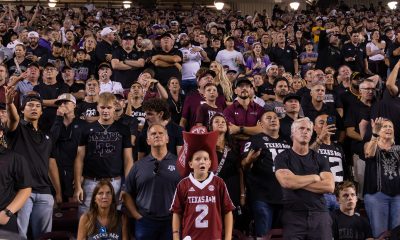
 Sports3 weeks ago
Sports3 weeks agoSEC Conference imposing a fine will create the opposite effect.
-

 Motorsports2 weeks ago
Motorsports2 weeks agoNASCAR This Week – Patriot Publishing LLC
-
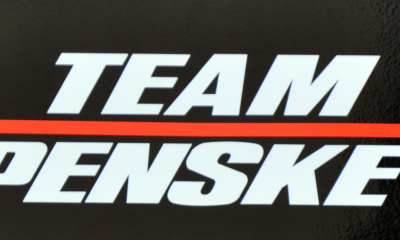
 Motorsports1 week ago
Motorsports1 week agoTeam Penske names new leadership































